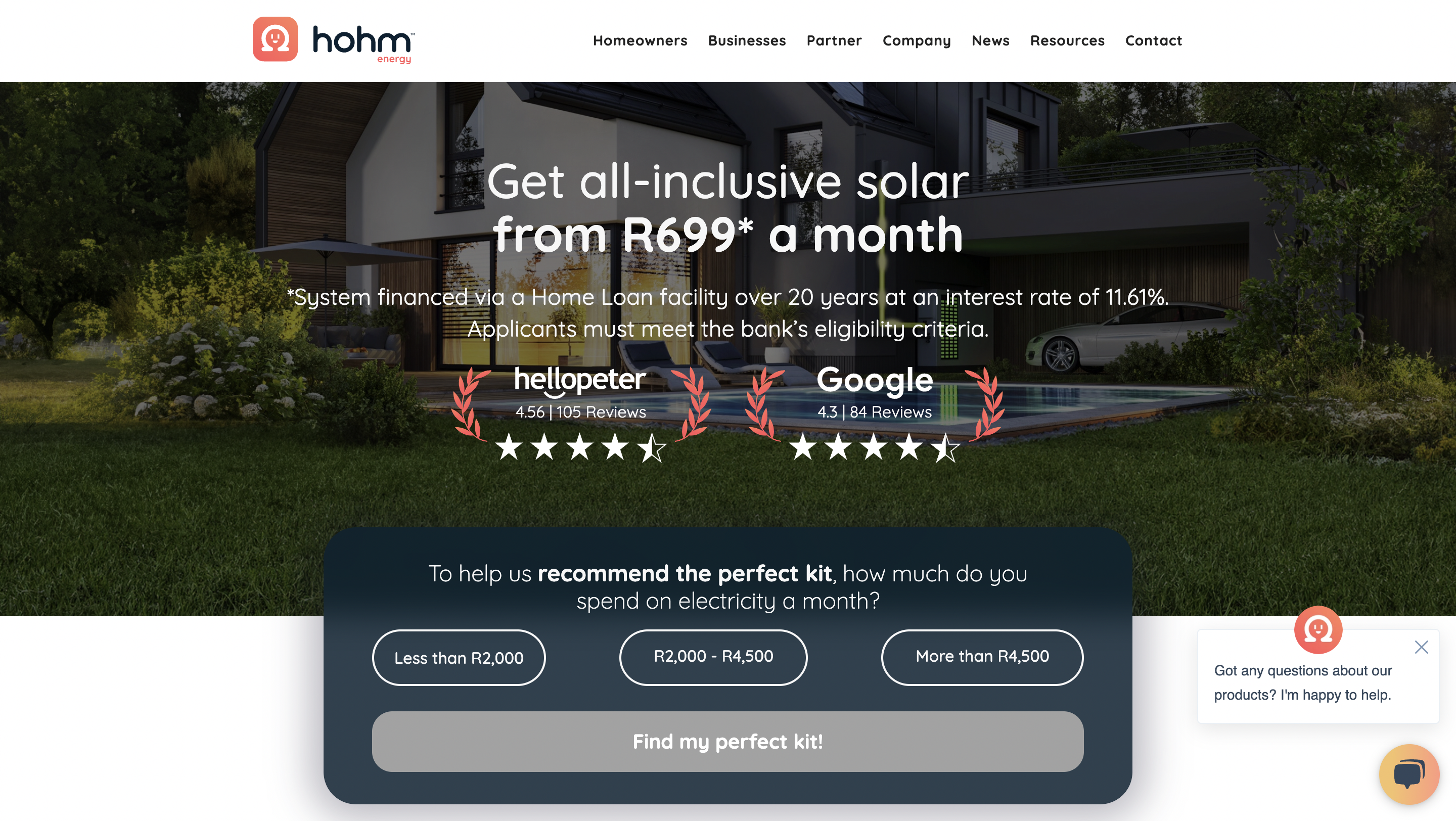Hohm Energy to scale adoption of rooftop solar across South Africa, backed by $8M seed
In the face of South Africa’s worsening energy crisis, marked by increasingly severe power shortages, implementing daily electricity rationing has become imperative to avert the risk of a nationwide grid collapse. According to the state-owned power generator Eskom, the country witnesses a significant power deficit, surpassing 6,000 megawatts on occasion.
This situation is similar in most African countries, thereby increasing the demand for solutions provided by clean tech startups across the continent. In the latest development, three-year-old Hohm Energy, which connects homeowners and businesses with accredited solar installers, product suppliers, and embedded solar finance in South Africa, has raised $8 million in seed investment.
The funding, whose first tranche of $4.25 million came in Q4 2022, is the largest seed round for a tech startup in South Africa, according to Hohm Energy. It was led by E3 Capital and 4DX Ventures, attracting participation from Breega, E4E Africa, Musha Ventures, Climate Capital Ventures, TO.org, Tekton Ventures and Sunu Capital.
Hohm Energy says its solution was built as an alternative and sustainable energy source for over 7 million addressable households connected to South Africa’s national grid. Founded in 2021 by Tim Ohlsen and Emir Gluhbegovic, Hohm Energy runs a software and marketplace model connecting different stakeholders in the $51 billion rooftop solar market value chain. The clean tech streamlines design, scheduling and procurement for installers while improving accessibility for buyers.
CEO Ohlsen, in an interview with TechCrunch, said the startup wants to empower homeowners to harness clean, renewable energy despite the challenges of navigating a complex industry with technical nuances and product choices.
“Purchasing a solar system can inevitably be a very costly investment. Our average order value ranges between $8,000 [and] $12,000. We have done extensive installations, too, so it is not something people haphazardly decide on,” said Ohlsen. “It is something they take a lot of interest in, and it’s just a tough place for them to navigate. We do a lot of research so that when they come into the marketplace, we match them with a trusted solar installer, so they don’t have to worry about the quality of installation.”
The chief executive added that one of the startup’s strongest propositions is its “Home Ranger” feature. Each installation initiated through its marketplace is supervised by a Home Ranger who conducts a comprehensive assessment to ensure technical and legal compliance.
In short, Hohm Energy offers solar installers the chance to establish trust and handle every aspect of their solar projects, from design and management to financing and procurement. Meanwhile, customers benefit from a digital platform that assesses their property’s solar needs and provides access to credit financing. The platform also facilitates a fulfillment process, including post-sales services such as repair and maintenance.
“We walk the client through the journey and also work very closely with our trusted solar partners, providing them mobile apps and SaaS tools and workflows to streamline how they work with us and get access to quality jobs that originate and finance through our marketplace,” Ohlsen remarked. “Inevitably, we’re reducing friction for the homeowner, the solar installer, and finance providers and unlocking new growth potential that makes this, in our minds, the model to scale the solar industry.”

Image Credits: Hohm Energy
Before launching Hohm Energy, Ohlsen previously ran a digital utility and solar installation startup in South Africa. However, the business faced scalability challenges inherent in vertically integrated solar service provider models across the continent. Managing procurement, installation, and construction proved to be labor-intensive as the business needed to invest in more resources, including installers, engineers, procurement managers, and larger warehouses for importing panels and inverters, Ohlsen noted in the interview.
Ohlsen, recognizing these limitations, founded Hohm differently: an asset-light platform focused on reducing friction via software that automates proposal and custom design processes and connecting stakeholders through a marketplace that facilitates transactions between installers, homeowners, finance providers, and product suppliers, ultimately streamlining processes and lowering costs for all involved parties.
At first, Hohm Energy’s process involved homeowners entering the marketplace, designing their initial solar system using the SaaS tool, and selecting components through its procurement system. Next, they would schedule an energy adviser consultation to ensure the proposed solution meets their needs. Hohm Energy would then generate a final engineering proposal and present it to its banking partners for financing approval.
However, redirecting homeowners to third-party portals with retail banks often resulted in friction and drop-offs. So the clean tech struck partnerships with some of South Africa’s top retail financial institutions, including Investec, Nedbank, MFC, WesBank, and Capitec, allowing their customers to have access to three structured financing options: home loan finance, solar loan, or subscription/lease-to-own.
So far, Hohm Energy, whose model is similar to Norway’s Otovo, has produced more than 17,000 tailored solar rooftop designs utilizing its solar proposal engine, valued at $190 million. Additionally, it has facilitated over $90 million in finance applications to its retail banking partners. Ohlsen reported during the call that the business has seen a 4x to 5x increase in GMV (gross merchandise value) and revenue since its launch.
“The uniqueness of Hohm in the South African market is that we’ve got the most comprehensive way a homeowner can purchase a solar system because we work with the banks,” the CEO noted. “What also makes Hohm unique in the landscape is that we’re the only software-first business and marketplace in the country. We are looking at enabling the sector to scale so we are not perceived as the service provider.”
Ohlsen also notes that while Hohm Energy recognizes the scalability of its software and marketplace model to other markets facing similar power problems across Africa and other emerging markets, the clean tech remains focused on deepening its presence in South Africa, particularly as the current level of power disruption persists in the country. With the funding, Hohm Energy, which hopes to attain sustainable profitability this year, will also look to double down on its climate fintech strategy, bolster its tech and launch a program to train local solar installers.
“We are thrilled to announce our inaugural investment in Hohm Energy. With its tech-driven approach, Hohm is at the forefront of South Africa’s green energy revolution,” said Vladimir Dugin, senior partner at E3 Capital, on the investment. “The team is uniquely positioned to create a “one-stop shop” for all green solutions for residential customers and address existing challenges around energy supply.”

